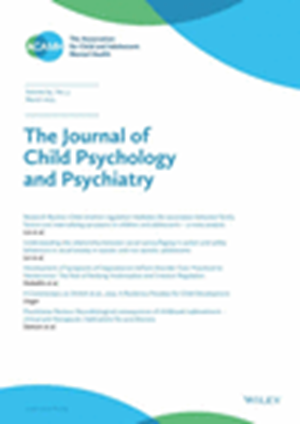Advancing adolescent bedtime by motivational interviewing and text message: a randomized controlled trial.
IF 6.5
1区 医学
Q1 PSYCHIATRY
引用次数: 0
Abstract
BACKGROUND Sleep deprivation is a prevalent problem among adolescents which is closely related to various adverse outcomes. The lack of efficacy of current sleep education programs among adolescents argues for the need to refine the content and format of the intervention. This study aimed to evaluate the effectiveness of a group-based sleep intervention using motivational interviewing plus text reminders in changing adolescent sleep habits. METHODS This study is a randomized controlled trial comparing motivational group-based sleep intervention with nonactive control group. The primary outcomes were the sleep-wake patterns measured by both sleep diary and actigraphy at postintervention, 3 and 6 months after the intervention. The trial was registered with the Clinical Trial Registry (NCT03614572). RESULTS A total of 203 adolescents with school day sleep duration of <7 hr (mean age: 15.9 ± 1.0 years; males: 39.9%) were included in the final analysis. Sleep diary and actigraphy data both showed that adolescents in the intervention group had earlier weekday bedtime at postintervention (sleep diary: estimated mean difference: 33.55 min, p = .002; actigraphy: 33.02 min, p = .009) and later wake-up time at 3-month follow-up compared to the control group (sleep diary: -28.85 min, p = .003; actigraphy: -30.03 min, p = .01), and the changes in diary measured weekday bedtime were sustained up to 6-month follow-up. In addition, adolescents in the intervention group had longer sleep diary reported weekday sleep duration at 3- (35.26 min, p = .003) and 6-month follow-up (28.32 min, p = .03) than the controls. Adolescents in the intervention group also reported improved daytime alertness postintervention, which was maintained at the 6-month follow-up. CONCLUSIONS The motivational group-based sleep intervention is effective in advancing bedtime with improved sleep duration and daytime alertness in sleep-deprived adolescents.通过动机性访谈和短信促进青少年就寝:一项随机对照试验。
背景:睡眠剥夺是青少年普遍存在的问题,与各种不良后果密切相关。目前青少年睡眠教育项目缺乏效果,因此需要改进干预的内容和形式。本研究旨在评估基于群体的睡眠干预的有效性,使用动机性访谈和文本提醒来改变青少年的睡眠习惯。方法采用随机对照试验,比较动机组和非主动组的睡眠干预。主要结果是干预后、干预后3个月和6个月通过睡眠日记和活动记录仪测量的睡眠-觉醒模式。该试验已在临床试验注册中心注册(NCT03614572)。结果203名在校日睡眠时间<7小时的青少年(平均年龄:15.9±1.0岁;男性:39.9%)纳入最终分析。睡眠日记和活动记录仪数据均显示干预组青少年在干预后的工作日就寝时间更早(睡眠日记:估计平均差异:33.55分钟,p = 0.002;在3个月的随访中,与对照组相比,活动记录:33.02 min, p = 0.009)和更晚的起床时间(睡眠日记:-28.85 min, p = 0.003;活动记录仪:-30.03分钟,p = 0.01),日记测量的工作日就寝时间的变化持续到6个月的随访。此外,干预组青少年的睡眠日记报告的工作日睡眠时间在3-(35.26分钟,p = 0.003)和6个月随访(28.32分钟,p = 0.03)均长于对照组。干预组的青少年在干预后也报告了白天警觉性的提高,这在6个月的随访中保持不变。结论基于动机组的睡眠干预对睡眠不足青少年提前就寝、改善睡眠时间、提高白天警觉性是有效的。
本文章由计算机程序翻译,如有差异,请以英文原文为准。
求助全文
约1分钟内获得全文
求助全文
来源期刊
CiteScore
13.80
自引率
5.30%
发文量
169
审稿时长
1 months
期刊介绍:
The Journal of Child Psychology and Psychiatry (JCPP) is a highly regarded international publication that focuses on the fields of child and adolescent psychology and psychiatry. It is recognized for publishing top-tier, clinically relevant research across various disciplines related to these areas. JCPP has a broad global readership and covers a diverse range of topics, including:
Epidemiology: Studies on the prevalence and distribution of mental health issues in children and adolescents.
Diagnosis: Research on the identification and classification of childhood disorders.
Treatments: Psychotherapeutic and psychopharmacological interventions for child and adolescent mental health.
Behavior and Cognition: Studies on the behavioral and cognitive aspects of childhood disorders.
Neuroscience and Neurobiology: Research on the neural and biological underpinnings of child mental health.
Genetics: Genetic factors contributing to the development of childhood disorders.
JCPP serves as a platform for integrating empirical research, clinical studies, and high-quality reviews from diverse perspectives, theoretical viewpoints, and disciplines. This interdisciplinary approach is a key feature of the journal, as it fosters a comprehensive understanding of child and adolescent mental health.
The Journal of Child Psychology and Psychiatry is published 12 times a year and is affiliated with the Association for Child and Adolescent Mental Health (ACAMH), which supports the journal's mission to advance knowledge and practice in the field of child and adolescent mental health.

 求助内容:
求助内容: 应助结果提醒方式:
应助结果提醒方式:


